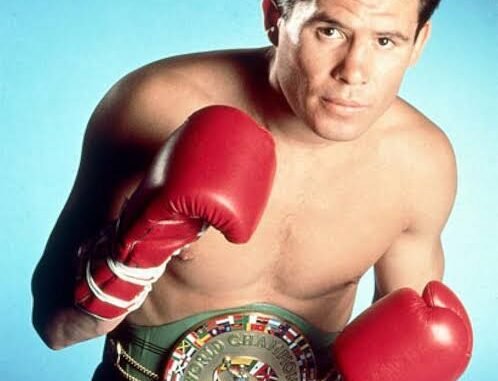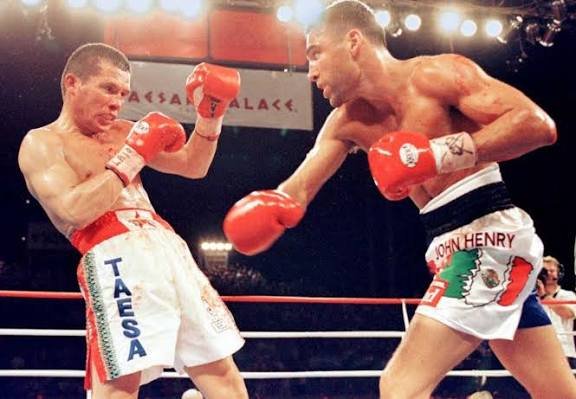
1. Introduction

Julio César Chávez remains a towering figure in boxing history, celebrated for his dominance across multiple weight classes. His legendary bout against Oscar De La Hoya in 1996—aptly titled “Ultimate Glory”—cemented his legacy in the sport. But the saga of the Chávez family continued with his son, Julio César Chávez Jr., whose fall from grace involved visa issues and deportation, igniting headlines and controversy. This article delves into three compelling chapters: the Chávez vs. De La Hoya clash, Chávez Sr.’s multi-weight-class achievements, and the legal and public aftermath tied to Chavez Jr.’s deportation.
2. Chávez vs. De La Hoya: “Ultimate Glory”
At Caesars Palace on June 7, 1996, Julio César Chávez faced a battle many dubbed a “dream match” against the undefeated Oscar De La Hoya. Both champions were vying for the WBC super lightweight title, drawing massive attention.
Fight Facts:
-
Weight class: Super lightweight (139 lb each)
-
Result: De La Hoya won by TKO in Round 4, as Chávez suffered a severe facial cut and ultimately could not continue.
De La Hoya’s swift yet powerful assault included a vicious combination that broke Chávez’s nose and forced a stoppage. That same matchup defined De La Hoya’s ascent and marked a pivotal moment in Chávez’s storied career.
3. Chávez’s Weight Class Conquests
Julio César Chávez carved out a dynamic and historic path across boxing’s weight divisions, showcasing both versatility and endurance.
Championship Titles Across Divisions:
-
WBC Super Featherweight (1984)
-
WBA Lightweight (1987) & WBC Lightweight (1988)
-
WBC Light Welterweight (1989, again in 1994)
-
The Ring Lightweight Championship (1988)
Signature Victories
Chávez’s ledger reads like a who’s who of elite boxing talent, including wins over:
-
Rafael Limón, Meldrick Taylor, Roger Mayweather, Héctor “Macho” Camacho, Frankie Randall, Greg Haugen, and many more.
With six world titles in three different weight divisions—and sustained dominance across them—Chávez earned deep respect. His accolades include:
-
Ranked 17th best pound-for-pound fighter ever by BoxRec
-
Ranked 24th on ESPN’s 50 Greatest Boxers of All Time
-
Ranked 18th on The Ring’s 80 Best Fighters of the Last 80 Years
-
Inducted into the International Boxing Hall of Fame in 2011
Chávez’s reign was about more than belts: it represented longevity, adaptability, and an unyielding Mexican pride that resonated beyond the ring.
4. The Deportation Twist: Julio César Chávez Jr.
While Chávez Sr. built a legendary legacy, his son, Julio César Chávez Jr., carved a much more turbulent path—one marked by legal troubles, addiction, and eventual deportation.
Key Timeline:
-
July 2, 2025: Chávez Jr. is arrested by U.S. Immigration and Customs Enforcement (ICE) in Los Angeles, accused of visa overstay and fraudulent statements on a green card application. He entered the U.S. on a tourist visa in August 2023, which expired in February 2024. He had also applied for permanent residency in April 2024, allegedly lying in the process. Authorities flagged him as a public safety threat.
-
Chávez Jr. was believed to have links to the Sinaloa Cartel, and Mexico had an outstanding arrest warrant (since March 2023) for arms trafficking and organized crime, prompting extradition proceedings.
-
August 19, 2025: Chávez Jr. is deported to Mexico and incarcerated in Hermosillo, Sonora, following confirmation by Mexican President Claudia Sheinbaum and multiple reporting outlets.
-
The deportation marked the culmination of a 46-day detention by ICE and ended with his immediate imprisonment on Mexican charges. Investigations date back to 2019 under Mexico’s attorney general Alejandro Gertz Manero.
Chávez Jr.’s troubled history includes:
-
A 2012 DUI conviction, with a sentence of 13 days in jail
-
A 2024 arrest for possession of two AR-style ghost rifles, released on bond and mandated to enter a drug rehabilitation program
-
A boxing career blemished by drug addiction, failed drug tests, weight issues, and inconsistent performances
His deportation and existing criminal charges in Mexico stand in sharp contrast to his father’s celebrated legacy—casting a somber shadow over the Chávez name.
5. Legacy Revisited: Contrasts & Continuities
The story of the Chávez family is one of legacy and fallibility, triumph and scandal.
-
Chávez Sr. symbolizes grit, cross-division brilliance, and boxing greatness. His match with De La Hoya encapsulated the pinnacle of his career—and the weight-class versatility that defined it.
-
Chávez Jr., by contrast, embodies a modern tragedy: talent undermined by personal demons and legal chaos, culminating in a dramatic deportation.
Together, their narratives weave a complex commentary on fame, heritage, and the often-unforgiving nature of both sport and law.
Frequently Asked Questions (FAQs)
Q1. Who won the Julio César Chávez vs. Oscar De La Hoya fight?
-
Oscar De La Hoya emerged victorious via TKO in the fourth round of their June 7, 1996, bout for the WBC super lightweight title.
Q2. What weight classes did Julio César Chávez win titles in?
-
Chávez won world titles in super featherweight, lightweight, light welterweight, and captured The Ring lightweight championship. He secured six world titles across three weight divisions.
Q3. Why was Julio César Chávez Jr. deported?
-
Chávez Jr. overstayed his U.S. visa, made fraudulent statements on a green card application, and had an active arrest warrant in Mexico for alleged connections to the Sinaloa Cartel and organized crime.
Q4. How long was Chávez Jr. detained before deportation?
-
He was held by U.S. authorities for 46 days before being deported and immediately jailed in Sonora, Mexico.
Q5. What charges does Chávez Jr. face in Mexico?
-
He faces allegations of arms trafficking, organized crime association, and drug trafficking, based on a warrant stemming from investigations dating back to 2019.
Q6. Was Chávez Jr.’s deportation confirmed by officials?
-
Yes, the deportation and incarceration in Hermosillo, Sonora, were confirmed by Mexican President Claudia Sheinbaum, multiple media outlets, and Mexican national registry data.
Conclusion
Julio César Chávez stands as a legend not only of Mexican boxing but of the sport itself—an icon whose power, skill, and cross-divisional success remain unmatched by many. His defining battle against Oscar De La Hoya epitomizes the heights of boxing glory. Yet, the tragic arc of his son—marked by legal drama, addiction, and deportation—reveals the fragility behind fame.
This duality underscores the complexities of legacy: one man’s triumph and another’s downfall, intertwined by blood and circumstance.
